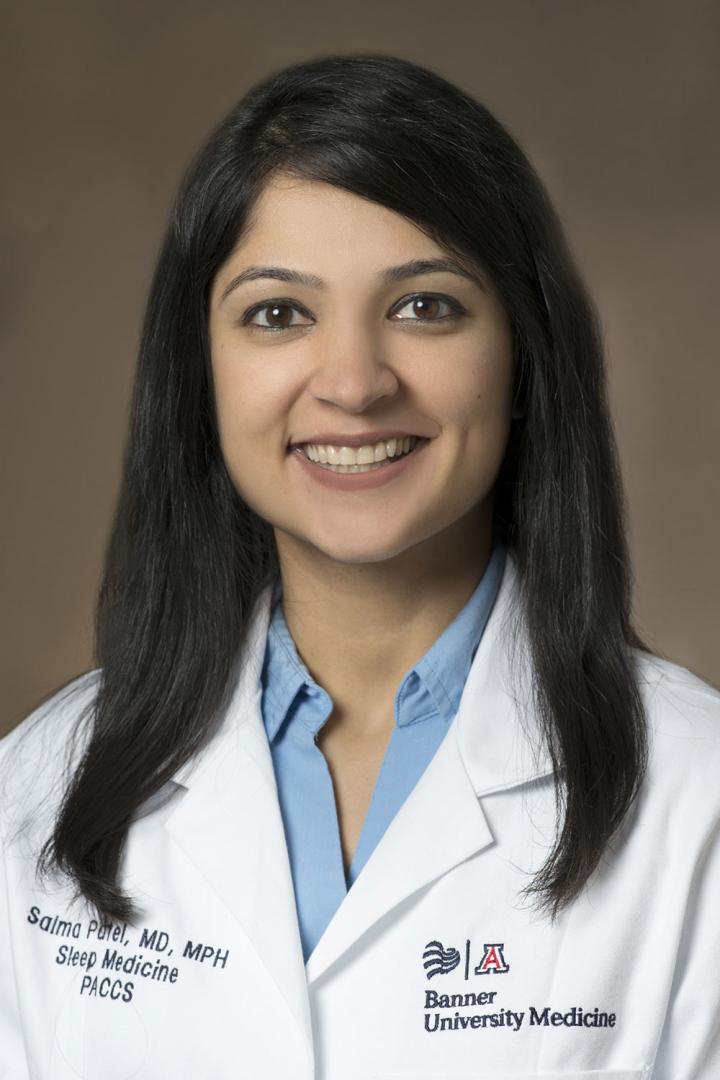
IMAGE: Salma Patel, M.D., M.P.H., an assistant professor and sleep medicine specialist in the UA Division of Pulmonary, Allergy, Critical Care and Sleep Medicine, has won a $100,000 Career Development Award… view more
Credit: UA Health Sciences
TUCSON, Ariz. – Obstructive sleep apnea is a common condition that has been associated with increased mortality, especially in individuals who have cardiac arrhythmia. A University of Arizona physician-scientist has received a grant to try to find out why.
Salma Patel, MD, MPH, an assistant professor and sleep medicine specialist in the UA Division of Pulmonary, Allergy, Critical Care and Sleep Medicine, has won a $100,000 Career Development Award from the American Academy of Sleep Medicine for her project, “Cardiorespiratory Interactions during Noninvasive Ventilation,” which will analyze the National Heart, Lung, and Blood Institute-funded Sleep Heart Health Study and Banner Health databases to understand the relationship between obstructive sleep apnea and death.
Dr. Patel will review baseline markers of ventricular repolarization — the heart’s return to a resting state — in patients with obstructive sleep apnea. She will evaluate the markers’ impact on the mortality of sleep apneas/hypopneas (periods of no breathing/abnormally slow or shallow breathing) and methods used by patients who have breathing problems during sleep, such as continuous positive airway pressure, or CPAP, devices.
Dr. Patel notes, “There is uncertainty over how to optimally use devices in individuals with sleep-disordered breathing and cardiac disease. The study aims, if successful, would be highly impactful and also could lead to clinical trials to evaluate alternative devices.”
Dr. Patel’s funding is an American Board of Sleep Medicine (ABSM) Junior Faculty Award, which supports a two-year mentored research project for early-career faculty who are physician-scientists in sleep medicine.
Among her mentors are Sairam Parthasarathy, MD, professor of medicine, pulmonary division chief, UA College of Medicine – Tucson, and director, UA Health Sciences Center for Sleep and Circadian Sciences and Banner – University Medicine Center for Sleep Disorders; Raymond L. Woosley, MD, PhD, professor of medicine and biomedical informatics, UA College of Medicine – Phoenix; and Wojciech Zareba, MD, PhD, professor of medicine, director of Cardiology Clinical Research and the Heart Research Follow Up Program, University of Rochester Medical Center, Rochester, N.Y. She also will work closely with Bonnie LaFleur, PhD, a statistician and research professor of biostatistics with the UA BIO5 Institute and UAHS Center for Biomedical Informatics and Biostatistics.
Dr. Patel joined the faculty at the UA College of Medicine – Tucson in fall 2018. She earned her medical degree from the UA College of Medicine – Phoenix and a master’s in public health from the UA Mel and Enid Zuckerman College of Public Health in 2013. She did her residency training in internal medicine at the Mayo Clinic, Scottsdale, and her fellowship in sleep medicine (adult and pediatric) at the Mayo Clinic in Rochester, Minn. She came to the United States from Tanzania in 2002 to attend Luther College in Decorah, Iowa.
###
About the University of Arizona Health Sciences
The University of Arizona Health Sciences is the statewide leader in biomedical research and health professions training. The UA Health Sciences includes the UA Colleges of Medicine (Phoenix and Tucson), Nursing, Pharmacy and Mel and Enid Zuckerman College of Public Health, with main campus locations in Tucson and the growing Phoenix Biomedical Campus in downtown Phoenix. From these vantage points, the UA Health Sciences reaches across the state of Arizona and the greater Southwest to provide cutting-edge health education, research, patient care and community outreach services. A major economic engine, the UA Health Sciences employs approximately 4,000 people, has approximately 800 faculty members and garners more than $140 million in research grants and contracts annually. For more information: uahs.arizona.edu
Disclaimer: AAAS and EurekAlert! are not responsible for the accuracy of news releases posted to EurekAlert! by contributing institutions or for the use of any information through the EurekAlert system.

